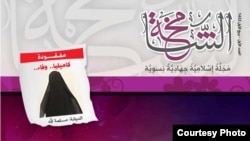A few months after the militant group Islamic State, or IS, took over the Syrian city of Raqaa and set up checkpoints, it encountered a problem: the militants' enemies were escaping the city disguised as women.
Male fighters could not physically check women who were dressed in traditional long robes and had their faces covered with veils. Their response was to launch the all-female al-Khansaa brigade. The brigade, named for a famous poet who was an early follower of the Prophet Muhammad, has taken other roles as well, including policing Raqaa to make sure women comply with the Islamic State's code of conduct.
Members move around Raqaa in groups, often carrying weapons. They stop and interrogate any woman who is without an escort, check couples to make sure the male chaperone is a relative allowed to travel with the woman, and ensure that women are dressed according to IS requirements.
The brigade also helps counter a public relations problem for the Islamic State.
“So we have an example of three Iraqi women who were raped by ISIS, who then committed suicide. This is bad press for them,” explained Mia Bloom, author of several books on women and terrorism.
Such bad press could hamper efforts to recruit women who are committed to the Islamic State's conservative ideology to come to Raqaa to marry their fighters. Humera Khan is with the Washington social activist group Muflehun, which works to counter violent extremism. To set up a society of like-minded people, Khan says, IS needs families, it needs its fighters to settle down and stay in the area; it needs wives who will encourage their men to go on jihad, and mothers who will indoctrinate their children.
Social media
To this end, women of IS and similar groups play up their sisterhood and camaraderie on social media. They create support groups, exchange recipes and discuss their friendships. They guide new recruits on what to do and what to expect.
“They give them tips on how to get to Syria without detection,” says Khan, noticing the contradiction to their own rules that women cannot travel without a companion. It is not the only way in which IS breaks its own rules for convenience.
Traditionally, Muslim women ask permission of their male guardian, or vali, for marriage. Khan recalls the case of a British woman who went to Syria to get married. She called back to get permission from her father, but when the father denied permission, IS leaders offered her a substitute vali.
Social media also facilitates marriages between IS fighters and women living outside Iraq and Syria. Khan follows Twitter accounts that belong to women in Europe who act as conduits and advertise on behalf of male fighters looking for wives and vice versa.
Beauty tips for Jihadi wives
The IS group is not alone in trying to create a female community to support its fighters. In 2004, the first web magazine for women called al-Khansaa was launched (despite the name, it is not linked to the al-Khansaa brigade). The magazine was aimed at creating a support community for wives of jihadi fighters.
It gave beauty tips and advice, says Bloom, such as “don’t get fat while your husband’s away, don’t spend all the money, be supportive of his desire to embark on the jihad.”
In 2011, al-Qaida introduced another magazine called al-Shamikha, meaning The Majestic Woman. Its slick treatment earned it the nickname "Jihadi Cosmo," referring to the American version of Cosmopolitan magazine. Its beauty and skin care tips conformed to the militants' strict ideology, like staying indoors or keeping the face covered to avoid sun damage. The first issue included interviews with the widows of militants and advice on how to marry a fighter, or raise a son to want to fight.
But Bloom says Shamikha went a little further in terms of women’s roles in jihad. Readers were encouraged not just to be good wives and mothers to their jihadi men, but also to pitch in as propagandists and fundraisers.
Coerced suicide bombers
While women who support the ideology of these groups are mostly confined to traditional roles in their societies, women who are considered outsiders are often used as a tactical tool.
Boko Haram is known to have coerced kidnapped women to become suicide bombers, through torture, threats of rape, or threats of violence against their families. An Iraqi extremist group, Ansaar al-Sunna, used the culture of shame associated with women’s sexuality. Its fighters first raped women, and when the women were rejected by their families and their communities, approached them and offered suicide bombing as a way to eradicate the shame brought on their families by the rape.
“And in the process you reinvent yourself as a martyr, a shahida, and 72 of your closest relatives get into heaven right away,” Bloom explained.
Bloom fears that hundreds of school girls kidnapped in April by Boko Haram may suffer a similar fate. “If they’ve been raped or sexually molested, the same honor code will apply that was used in Iraq.”




